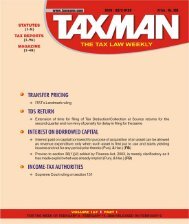news round up - Taxmann
news round up - Taxmann
news round up - Taxmann
- TAGS
- news
- round
- taxmann
- taxmann.com
You also want an ePaper? Increase the reach of your titles
YUMPU automatically turns print PDFs into web optimized ePapers that Google loves.
2010] Commissioner, Trade Tax v. Ramco Coke Industries (All.) 199<br />
A<br />
B<br />
C<br />
D<br />
E<br />
F<br />
G<br />
burning loss. He submitted that the Tribunal in its order has also observed<br />
that in the manufacturing of Hard Coke from coal a manufacturing<br />
process is involved in which its nature changes but there is no difference<br />
in fundamental nature, therefore, it has been admitted by the Tribunal<br />
also that in the manufacturing of Hard Coke from coal a manufacturing<br />
process is involved and the nature of the commodity changes. Therefore,<br />
treating both the items as one and the same is wholly unjustified. He<br />
submitted that coal and Hard Coke are two different commodities by its<br />
composition, nature and use. Though it is true that both coal and Hard<br />
Coke are used as a fuel but two commodities being different to each other<br />
and Hard Coke is manufactured and obtained as a manufactured product<br />
from the coal by a burning process.<br />
6. Having heard learned counsel for the parties, I have perused the order<br />
of the Tribunal and authorities below.<br />
7. It appears that the coal breezes are being burnt at a specific temperature<br />
to remove the impurities from the coal and as a result of such burning<br />
process Hard Coke is obtained. Hard Coke is a highly combustible item.<br />
Though breezes and Hard Coke both are used as fuel but Hard Coke is<br />
used for specific purposes being highly combustible.<br />
8. The manufacture is defined under section 2(e-1) of the Act reads as<br />
follows :<br />
“‘Manufacture’ means producing, making, mining, collecting, extracting,<br />
altering, ornamenting, finishing or otherwise processing, treating or adapting<br />
any goods but does not include such manufacture or manufacturing process<br />
as may be prescribed.”<br />
9. The above definition is very wide as held by this Court in B.P. Oil Mills<br />
Ltd. v. Sales Tax Tribunal AIR 1998 SC 3055. The definition of ‘manufacture’<br />
in section 2(e-1) of the Act includes “processing, treating or adapting<br />
any goods”. Thus, the meaning of “manufacture” in the U.P. Trade Tax Act<br />
is wider. A dealer will be liable to pay tax on sale of any goods he makes<br />
by processing, treating or adapting the goods he purchased. In B.P. Oil Mills<br />
Ltd.’s case (s<strong>up</strong>ra), the S<strong>up</strong>reme Court held that refining crude oil amounts<br />
to a “manufacture”.<br />
10. In the case of Chowgule & Co. (P.) Ltd. v. Union of India AIR 1981 SC<br />
1014 the Apex Court observed that where any commodity is subjected to<br />
a process or treatment with a view to its development or preparation for<br />
the market it would amount to processing. The nature and extent of<br />
processing may vary from case to case, in one case the processing may be<br />
slight and in another it may be extensive; but in each process suffered the<br />
commodity would experience a change. The Court further observed that<br />
whatever be the means employed for carrying out of processing operation.<br />
It is the effect of the operation on the commodity that is material for<br />
the purpose of determining whether the operation constitutes processing.<br />
GOODS & SERVICES TAX CASES ❑ JANUARY 20 - FEBRUARY 4, 2010 ◆ 75











![“FORM NO. 3CEB [See rule 10E] Report from an ... - Taxmann](https://img.yumpu.com/45480232/1/190x245/form-no-3ceb-see-rule-10e-report-from-an-taxmann.jpg?quality=85)





